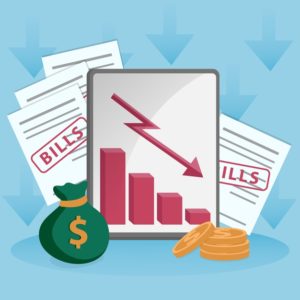6 Tips on How to Get Rid of Medical Debt
This pandemic has put a lot of Americans in debt due to their medical expenses. You may feel overwhelmed and that it’s impossible to get out of debt. Don’t worry. It is possible to deal with your medical debts, even with your other expenses. It’s vital to deal with unpaid medical bills; it stays on your credit history for seven years and can negatively impact your credit score.
This article will discuss six ways to avoid going into collections due to your medical debt. If all your unsecured debts are too much for you to handle, consider filing for bankruptcy to get them discharged. Bankruptcy protection helps Americans deal with their debt, giving them a fresh start at a secure financial future. Talk to our experienced Chicago bankruptcy lawyers.
6 Tips for Paying off Medical Debt
If you’re having difficulty with how to get your medical bills paid off, your first thought should be how to keep it out of collections and prevent harassment from debt collectors. Plenty of medical providers and hospitals would instead work with you to figure out a way to pay rather than give your bill over to a debt collection agency.
Look into hardship plans.
 There are medical providers and hospitals with options for low-income patients. Ask your medical provider if you qualify for these plans. The relief given may range from dividing the balance into smaller payments, or forgiving a part of the debt, making it more manageable to pay off.
There are medical providers and hospitals with options for low-income patients. Ask your medical provider if you qualify for these plans. The relief given may range from dividing the balance into smaller payments, or forgiving a part of the debt, making it more manageable to pay off.
Negotiate
It’s best to negotiate medical costs before treatment even happens. However, you can still ask your provider to adjust your bills.
Hospitals may often bill you the maximum rate, especially if you don’t have insurance. Try negotiating your rates down to what an insurance company would have to pay.
Review your bills
Ask for an itemized bill of your medical expenses. Carefully scrutinize your bills for errors, unauthorized charges, and duplicate medical billing. Ensure that your insurance pays for the costs they have to cover. Doing this can shave off some amount from the debt owed.
Use medical credit cards.
Medical cards can be a cheaper alternative to standard credit cards. You’ll find that they provide Introductory 0% interest financing, more extended term financing, and mid-range interest rate on revolving credit. Make sure to pay off your balance before the end of the introductory period, or you may face higher interest rates. Ask your medical provider first if they accept such cards.
Try Charity Care Programs or Financial Assistance
Ask your provider if they provide a charity care program or if they have a financial assistance policy. If not, look into local charity organizations to help with medical bills.
Consider a payment plan.
Try working out a payment plan with your provider. Ask if it’s possible to minimize interest. Get this agreement in writing.
If you’re looking for debt relief from medical bills, as well as student loan debt, tax debt, or credit card debt, it may be best for you to file bankruptcy. Ask our experienced bankruptcy attorneys about which option is best for you.
What if your Debt is Already in Medical Collections?
It can be tricky dealing with debt collectors. If your medical debt is overwhelming and you fail to pay it off in time, your medical provider will send your medical bill over to a debt collection agency. You may be hounded by a debt collector repeatedly making collection calls asking you to pay your debt. Here’s what you can do when your debt is in collections.
Verify: Ask the collection agency to give you a written explanation of your bill. Like with the tip above, check it for any errors. Doing so protects you from scammers trying to take advantage of your vulnerable position.
Dispute: If you spot any errors, dispute them immediately with the collection agencies, your healthcare provider, or your health insurance company. Disputing errors may lower the amount you need to pay.
Negotiate: Try negotiating with the collection agency about a manageable monthly payment plan or a reduced payout. You may ask an experienced Chicagoland lawyer to deal with the negotiation for you.
Moving Forward After Medical Debt
It can be a challenging experience to deal with medical debt. After which, you have to monitor your credit score and credit reports. Keep making payments on time, and try budgeting according to your means. Eventually, you’ll bounce back and regain your creditworthiness.
If you’re having trouble dealing with debt and want financial protection, maybe you can try to file for bankruptcy. Depending on the bankruptcy chapter, you can reorganize your different types of debt to make them easier to pay back or have your assets liquidated to pay off the debt you incurred. Don’t worry. It’s possible to rebuild credit scores after bankruptcy. Talk to our Chicago area experienced bankruptcy attorneys at Cutler & Associates, Ltd. for debt help!


